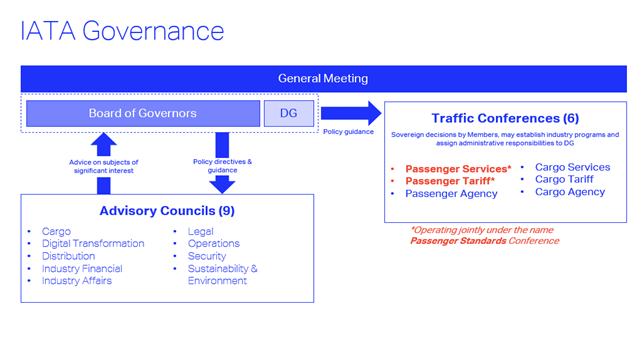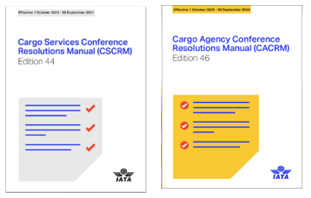Airlines operate in an increasingly complex and connected world. Operating globally, they must deal with diverse regulations, different currencies, and fluctuating fuel prices. Airlines must strike a delicate balance between maximizing revenue and efficiently utilizing cargo load. The evolution of technology, regulations, and consumer behavior requires continuous attention from IATA and its members to ensure our industry is governed by a modern and fit-for-purpose set of standards.
Standards are critical for our industry. They help ensure an efficient air transportation industry and help companies gain wide-scale adoption of their solutions and practices. Standards reduce cost, encourage innovation, and provide a better experience for air cargo customers, and they form the foundation for industry partners to scale up globally with their solutions. They are developed and adopted under the IATA Conference Structure, where all members can participate and vote.

IATA creates standards, best practices and guidance for the industry across the spectrum of activity, from safety and security to operational and advanced processing. The IATA Traffic Conferences are the fora in which IATA member airlines have ultimate decision-making authority to providing a unique platform to exchange industry information.
- Passenger Standards Conference (Passenger Services and Tariff Conference)
- Passenger Agency Conference
- Cargo Services Conference
- Cargo Tariff Conference
- Cargo Agency Conference
Active participation from an airline to all IATA Traffic Conferences is of paramount importance. An airline’s accredited representatives and alternates play a vital role in the standard-setting activities of the Conferences. They participate to industry discussions, present airlines’ positions, and ultimately vote on standards that are binding for all industry participants. It not only ensures a smooth and efficient functioning of our industry, but also guarantees that an airline participates in, debates on, and ultimately influences the formulation of the industry standards in a way that is representative, inclusive, and that enhances operational efficiency and experience. Adopting, changing or rescinding a resolution requires unanimous support from all airlines participating in the Conferences.
The Provisions for the Conduct of the IATA Traffic Conferences (pdf) require members’ accredited representatives to be directly appointed by airlines CEO who can then appoint alternates.

The Cargo Services Conference (CSC) manages all standards activity touching the technical requirements and procedures necessary for the proper handling and facilitation of multilateral cargo interlining. The CSC develops common industry positions on cargo services issues including cargo handling, documentation, procedures, rules and regulations, ULD control and technical specifications, dangerous goods regulations, live animals and perishables regulations, and automation standards.
The Cargo Tariff Coordinating Conference (CTC) serves as a pivotal platform for airlines worldwide to collaborate on tariff-related matters, ensuring harmonization and efficiency within the air cargo industry.
The Cargo Agency Conference (CAConf) is the acknowledged leader in establishing standards and providing customer-driven distribution services to the cargo industry. The CAC deals with relationships between airlines and sales intermediaries involved with the selling and processing of international air cargo. It works at strengthening industry capabilities, promoting industry reputation and enhancing commercial success for both airline and agent participants.
IATA encourages airlines to seize this opportunity to contribute and be part of keeping the airline industry running smoothly thanks to the structure that IATA’s governance provides. Please contact cargo@iata.org should you require additional information.